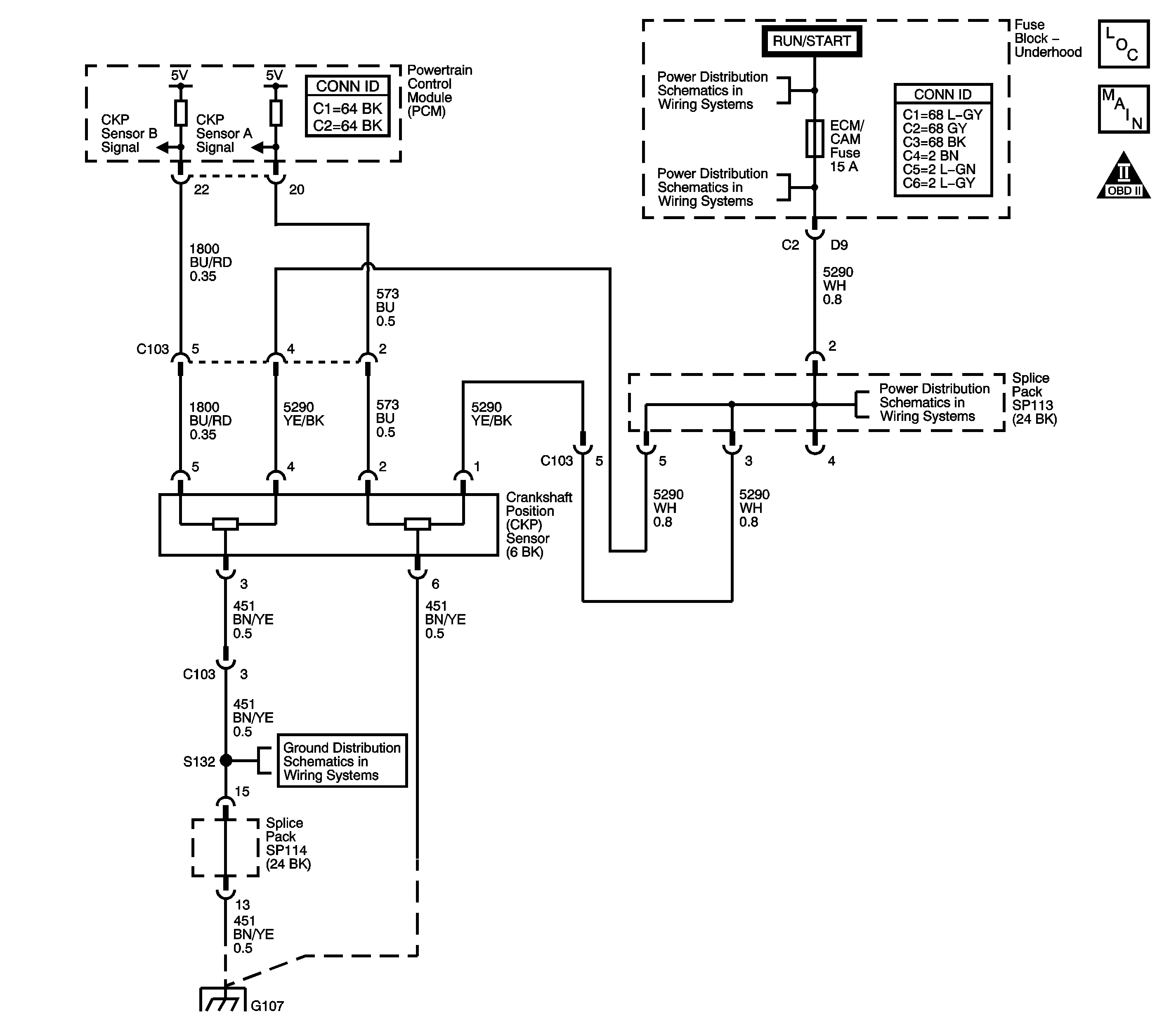
Circuit Description
This diagnostic monitors the signal from the CKP sensor A. The CKP sensor is a magnetic generator type sensor, producing an alternating current signal. The CKP sensor signal increases in both frequency and amplitude as the engine speed increases. The CKP sensor sends this reference signal to the powertrain control module (PCM) to indicate the crankshaft speed and position. This reference signal is used by the PCM to calculate fuel injection pulse, establish top dead center (TDC) for ignition timing and where to start ignition coil and injection sequencing. There will be no spark or fuel delivery if there is no CKP sensor signal from either CKP sensor.
DTC Descriptor
This diagnostic procedure supports the following DTC.
DTC P0335 Crankshaft Position (CKP) Sensor A Circuit
Conditions for Running the DTC
| • | DTC P0340, P0341, or P0385 are not set. |
| • | The starter is cranking the engine or the engine is running. |
| • | DTC P0335 runs continuously once the above conditions are met. |
Conditions for Setting the DTC
No crankshaft position sensor signal to the PCM for 5 seconds.
Action Taken When the DTC Sets
| • | The control module illuminates the malfunction indicator lamp (MIL) when the diagnostic runs and fails. |
| • | The control module records the operating conditions at the time the diagnostic fails. The control module stores this information in the Freeze Frame/Failure Records. |
Conditions for Clearing the MIL/DTC
| • | The PCM turns OFF the MIL after 3 consecutive trips without a fault. |
| • | The PCM clears a History DTC after 40 consecutive warm-up cycles without a fault. |
| • | Use the scan tool Clear DTC Information function. |
Diagnostic Aids
Inspect for the following conditions:
| • | Inspect the crankshaft position (CKP) sensor output signal with a scan tool. The scan tool will display engine speed while cranking when the PCM detects the CKP sensor A signal. Observe the Engine Speed parameter while cranking the engine. The scan tool should indicate at least a steady 200-300 RPM while cranking. |
| • | If DTC P0335 and DTC P0385 are both setting, inspect for a loose CKP sensor assembly or damage, foreign material on the signal marks of the crankshaft pulley. |
An intermittent malfunction may be caused by a fault in the CKP sensor electrical circuit. Inspect the wiring harness and the components for an intermittent condition. Refer to Intermittent Conditions .
Repair any electrical circuit faults that were found. Refer to Wiring Repairs in Wiring Systems.
The information included in the Freeze Frame data can be useful in determining the vehicle operating conditions when the DTC first set.
Test Description
The numbers below refer to the step numbers on the diagnostic table.
-
The Diagnostic System Check-Engine Controls prompts the technician to complete some basic checks and store the Freeze Frame data on the scan tool if applicable. This creates an electronic copy of the data taken when the fault occurred. The information is then stored in the scan tool for later reference.
-
This step determines whether the DTC P0335 is the result of a hard failure or an intermittent condition.
-
This step tests the CKP sensor input circuit.
-
After replacing the PCM new minimum throttle position and idle speed must also be established.
Step | Action | Values | Yes | No |
|---|---|---|---|---|
Connector End View Reference: Powertrain Control Module Connector End Views or Engine Controls Connector End Views | ||||
Did you perform the Diagnostic System Check-Engine Controls? | -- | Go to Step 2 | ||
Does the scan tool display a rolling count within the specified range? | 0-3 Counts | Go to Step 3 | Go to Step 4 | |
3 |
Is DTC P0335 set? | -- | Go to Step 4 | Go to Diagnostic Aids |
4 |
Did the test lamp illuminate? | -- | Go to Step 5 | Go to Step 8 |
5 |
Is the voltage near the specified value? | 12 V | Go to Step 6 | Go to Step 9 |
Is the voltage near the specified value? | 5.0 V | Go to Step 11 | Go to Step 7 | |
7 |
Did you find and repair a condition? | -- | Go to Step 15 | Go to Step 10 |
8 |
Did you complete the repair? | -- | Go to Step 14 | -- |
9 |
Did you complete the repair? | -- | Go to Step 14 | -- |
10 |
Did you find and correct a condition? | -- | Go to Step 14 | Go to Step 13 |
11 |
Did you find and correct a condition? | -- | Go to Step 14 | Go to Step 12 |
12 | Replace the crankshaft position sensor. Refer to Crankshaft Position Sensor Replacement . Did you complete the replacement? | -- | Go to Step 14 | -- |
Did you complete the replacement? | -- | Go to Step 14 | -- | |
14 |
Does the DTC run and pass? | -- | Go to Step 15 | Go to Step 2 |
15 | With a scan tool, observe the stored information, Capture Info. Does the scan tool display any DTCs that you have not diagnosed? | -- | System OK | |
